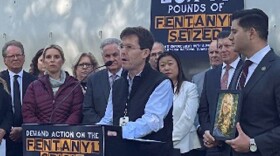Martha Bebinger
-
Amid NIH funding delays, clawbacks and uncertainty, a scientist at Harvard who studies breast cancer has lost one third of her lab employees and wonders if she can continue her research experiments.
-
WBUR's Martha Bebinger lost her nephew, Austen Smith, to a drug overdose last year. In this essay, she describes the pain and questions that linger.
-
What if people using drugs could get Narcan, clean needles and fentanyl tests as easily as Doritos or a candy bar? Harm reduction vending machines are ready for communities that don't fight their use.
-
There’s no single reason for the slight drop in opioid overdose deaths across most of the U.S. last year. But finding new ways to make Narcan available in public, 24 hours a day, is helping.
-
An estimated 42% of adults in the U.S. know someone who died from a drug overdose. That number is one of many in a Rand Corporation study that demonstrates the sweeping effects of the overdose crisis.
-
The surge in overdose deaths among teens is opening a new path to treatment: pediatricians. A doctor in Massachusetts shows how it works with a 17-year-old patient.
-
Fentanyl fueled unprecedented carnage with 112,000 fatal overdoses. The nation is increasingly divided over how to respond.
-
A mother monitors illegal drug use, at home, to prevent a fatal overdose for her daughter and others addicted to opioids.
-
Renae was so desperate to keep her child alive when so many others have died from overdose that she resorted to extreme measures — and extreme risks. She now supervises drug use in her own home.
-
Turns out diners are more likely to get on board for altruistic reasons rather than health. That's what one hospital learned after it pledged to reduce food-related greenhouse gas emissions.





